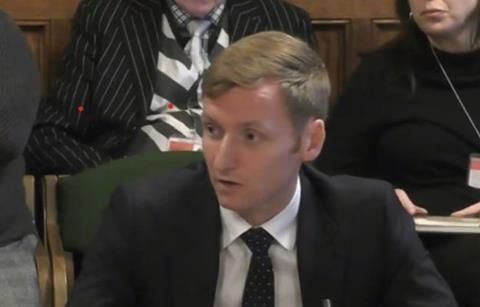The past nine housing ministers have come and gone in the time it takes to get a large project to site, says Joey Gardiner. So what are the chances that the latest incumbent in the role can do what is required to pick the industry up off the floor?

It takes an average of five years, , from submitting and validating a planning application on a large site to completion of the first homes. So, with the appointment this week of Lee Rowley as the Conservative government’s 16th housing minister since 2010, it turns out that you could have seen out the last nine ministers to hold the office in the average time required to get a big project from the drawing board to delivery.
Given this shockingly rapid turnover at the Department for Levelling Up, Housing and Communities (DLUHC), it is perhaps not surprising that Rachel Maclean’s sacking this week in prime minister Rishi Sunak’s reshuffle, a day before she was due to introduce the Renter’s Reform Bill to committee, has been greeted largely with irritation rather than enthusiasm.
The RIBA president Muyiwa Oki says the lack of continuity was “incredibly frustrating”, while Peter Hardy, partner at law firm Addleshaw Goddard, says it arguably does not matter who the replacement for the well-liked Maclean was, given how little time ministers are given, and that “the next incumbent will inevitably be gone, too, in a matter of months”.
Rowley and the sector will likely need to accept some tough realities about what can be achieved, practically and politically, in the time available
Despite this disappointment at yet another change of the guard in housing, the sector has given a cautious welcome to the man ultimately named to replace her. Rowley was, until this week, the local government and building safety minister.
The welcome for the 43-year-old, Chesterfield-born North East Derbyshire MP is largely due to his experience in the sector, gleaned not just as building safety minister but also from the fact that he has served, briefly, as housing minister before under Liz Truss’s doomed administration. Prior to that he was a construction minister in the department for Business, Energy and Industrial Strategy.
Geeta Nanda, chief executive of housing association MTVH, says: “The good thing is that, despite the change, at least we haven’t got someone completely new to the brief. He’ll have a grip on the policies already.”
The reality is that Rowley, a former management consultant, will need to hit the ground running in order to effect any impact on an overflowing in-tray of concerns – covering housing supply, affordability, quality, planning and demand – with a limited window before the next general election. Both Rowley and the sector will likely need to accept some tough realities about what can be achieved, practically and politically, in the time available.

Here is a briefing on the key issues and considerations as Rowley takes up his post:
Housebuilding numbers are falling sharply
Overwhelmingly the biggest issue facing the new-build sector – and arguably the biggest housing issue facing the UK as a whole – is the lack of new supply. Build rates are currently being driven down by a combination of the difficulties buyers are facing financing purchases at high borrowing rates and planning delays and the nutrient neutrality crisis slowing up the rate of land coming through the system.
The Home Builders Federation (HBF) has forecast that industry output could fall to as low as 120,000 in the coming years – half the number where it has been, with SMEs likely to be harder hit than major builders, and housing associations not in a position to fill in the gap.

The HBF has been calling for actions to boost demand for homes for first-time buyers – such as through a reboot to the Help to Buy scheme – while housing associations and those involved in affordable housing are calling for a funding boost to enable them to expand output.
“During the last housing crash, the housing associations stepped in to take the place of private builders,” says MTVH’s Nanda, “But this time we can’t, because of the financial pressures on associations.
“We need some kind of stimulus, so we keep construction going, and don’t lose the skills base of the industry.”
The harsh reality for the industry, however, is that Rowley is unlikely to make fixing this his central priority, as the decision to introduce the kinds of policies that could influence such things are made higher up – between No10, the Treasury and (if DLUHC is lucky) housing secretary Michael Gove. Ministers of state tend to focus primarily on managing the politics of policy implementation and legislation.
One industry insider with knowledge of the political scene says: “The reality is housing ministers have instructions to manage the political process of getting policy and legislation through, but policy is set higher up. His impact on policy will be minimal, he won’t be deciding anything significant.”
Depressingly, there are people saying Rachel Maclean was removed because she was seen as too ‘pro-housing’
Paul Brocklehurst, LPDF
Despite some speculation about the possibility of measures such as stamp duty cuts or Help to Buy-type measures to boost first-time buyers in next week’s autumn statement, observers say it is still not clear yet that Sunak wants his party to be seen as pro-housebuilding.
A reluctance to appear too development friendly may be exacerbated by the apparent tack towards traditional “blue-wall” Conservative voters signalled by the wider appointments in this week’s pre-election reshuffle, such as the bringing back of David Cameron.
The government already has no hope of meeting its 300,000 homes-a-year manifesto target and Paul Brocklehurst, chairman of the Land, Planning and Development Federation (LPDF), says: “Depressingly, there are people saying Rachel Maclean was removed because she was seen as too ‘pro-housing’.
“It feels like the government is trying to judge if it sees electoral value in being pro-housing, and isn’t sure which direction to jump. But, if they do focus on the blue wall, they’ll potentially be turning their back on a lot of red wall voters who do want more homes built.”
Legislation, legislation, legislation…
Rather than fixing the urgent new-build supply problem, Rowley’s more immediate focus is likely to be on piloting the two major pieces of housing legislation which the government wants on the statute book before the next election.
The Renters’ Reform Bill – a hangover from the last parliamentary session – and the Leasehold and Freehold Bill are both significant reforms in their own right, of the private rental market and the system of leasehold housing respectively. Both are necessary to deliver 2019 manifesto pledges.
The Renters’ Reform Bill, which will apply quality standards to the private sector and make lettings bans imposed on those on benefits or with children illegal, is designed to implement the manifesto pledge to abolish Section 21 “no-fault” evictions, while the Leasehold and Freehold Bill will make it easier for leaseholders to purchase their freehold, and ban the creation of leasehold homes.
Rico Wojtulewicz, head of housing at the House Builders Association, which represents SME builders, said that understanding the complex detail of what the government is proposing around rental and leasehold reform “will take some time”. The industry insider added: “Piloting legislation is what junior ministers do, and this will take priority.
“Taking this politically contentious stuff through parliament – that’s going to be the focus. He’s not going to be coming up with reforms for the big issues the housebuilding industry faces.”
Planning reforms
DLUHC has a big and complex planning reform agenda, part of which has just been kick-started by the passing of the Levelling Up and Regeneration Act, which will now require reams of secondary legislation to put it into action. The Act has put in place a framework for national development management policies and reforms of how local plans are made, among other changes.
Martin Curtis, public affairs consultant at Curtis Communications, says: “A lot of the changes require secondary legislation and consultations. He’ll have to get on and get this in place. He’ll want to do it, otherwise it potentially leaves the opposition with the freedom to undo what has been done [with the Act].”
However, many of the reforms in the Levelling Up and Regeneration Act are at some remove from the principal planning concerns of the industry, which are around slow and inconsistent decision-making at a local level, driven by political and policy uncertainty. Paul Smith, managing director of land promoter Strategic Land Group (SLG), says the priority needs to be “getting the planning system moving, in terms of plan-making and decision-taking”.

The LPDF’s Brocklehurst links the current sticky situation at local authority level to the long-delayed decision over reforms to national planning policy in the NPPF, with the proposals consulted on last year having apparently emboldened councils in the time since to row back on their development plans.
Brocklehurst said Rowley’s appointment could “absolutely possibly” contribute to delaying finalisation of the NPPF, as the government still hasn’t determined which way it wants to go. “I’ve heard people say now it could be not until the new year. It could all be in the too-difficult pile.”
SLG’s Smith concedes that, despite the need for the industry to get planning moving, “any uptick in completions resulting from planning reform is all but impossible before the election. Therefore, given it is controversial, politically the logical thing is to do nothing.”
Nutrient opportunity
One area of planning that Rowley may yet be asked to take action on is around the issue of nutrient neutrality, which housebuilders claims is holding up progress on up to 150,000 homes, and is particularly affecting SME builders. The government over the summer proposed quite far-reaching legislation exempting councils from environmental rules in order to allow them to approve planning applications in protected areas subject to nutrient pollution, but the legislation was voted down in the Lords.
Housing secretary Michael Gove initially pledged to try again with a new bill in the King’s Speech, but no such bill made it into the document.
However, with the government still determining its direction on housing, it is still possible that Rowley may be asked to bring forward a simple bill along the lines of the clauses proposed in the summer, or tack it on to other legislation.
Richard Patient, managing director of public affairs firm Thorncliffe, says: “It’s possible an opportunity may come up to have another vote on relaxing the nutrient neutrality rules – as that allowed the Conservatives a nice chance to undermine Labour earlier this year.”

SLG’s Smith says: “If I was the minister, I’d want maximum impact quickly for minimum amount of changes, so I’d look at nutrients. There’s a lot of applications that could be consented quickly if the legal situation was changed.”
Housing quality
Rowley will also inherit DLUHC’s agendas around housing quality, an issue which runs across social housing, with tighter regulation and improved focus on living conditions; building safety, with the new ��ɫ����TV Safety Act and the Responsible Actors Scheme for housebuilders bedding in; and private housebuilding, where it has prompted the setting up of the New Homes Ombudsman Service.
>> See also: King’ Speech 2023: Hopes of a nutrient neutrality bill dashed
>> See also: Starmer blasts Tory flip-flopping as he pledges to build a new Britain
However, experts suggest that these are likely to be second-tier issues for Rowley, despite their clear importance, given that they are established policy areas that are now in the implementation phase. The push on social housing quality, for example, may be primarily led by the Regulator of Social Housing, which has new consumer regulation powers.
Geeta Nanda says: “With social housing quality, for the minister I think it’ll be a case of letting the regulator get on with it.”



























No comments yet